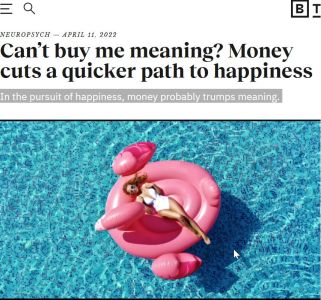
Can’t buy me meaning? Money cuts a quicker path to happiness
In the pursuit of happiness, money probably trumps meaning.
Recommendation
Which is a greater determiner of happiness: money or meaning? This question may take on particular importance if you find yourself closer to the “have-not” end of the spectrum, rather than being happily ensconced among the “haves.” When you’re a “have-not,” you might take comfort in the idea that your wealthier counterparts are vapid and materialistic, with lives devoid of meaning. Not so fast, says Elizabeth Gilbert, head of research at PsychologyCompass. According to studies, when you’re rich, not only can you buy meaningful experiences, but meaning becomes less important to your overall happiness.
Summary
About the Author
Elizabeth Gilbert is the head of research at PsychologyCompass, a company that blends technology and psychology to help people improve well-being and performance.







Comment on this summary